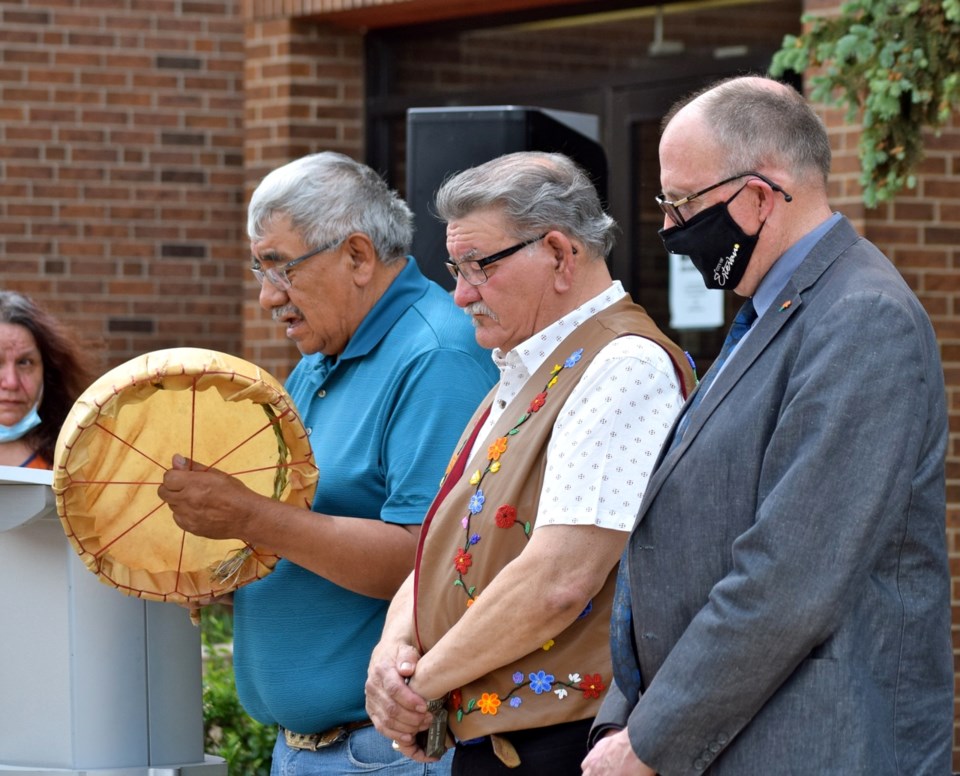As the deep words were said and the drums were played, dozens of people bowed their heads in downtown Estevan last Friday honouring the children who died in the residential school system.
The Métis Nation Saskatchewan Estevan Local No. 25 held a vigil in recognition of 215 Indigenous children whose remains were found on Tk'emlúps te Secwépemc, on the site of the former residential school in Kamloops, B.C. Close to 100 people gathered by city hall to listen to drums, speeches and prayers, recognizing people that suffered and died in the residential school system.
The words and prayers said that day touched on many people attending the ceremony.
Métis Nation Saskatchewan Estevan Local No. 25 president Linda Sopp opened the ceremony.
"That is just the tip of the iceberg because there are many, many other places where that has happened," said Sopp in regards to the discovery of children's remains.
Elder Michael Lonechild from White Bear First Nations, who is also a famous artist, took the word first.
"It's a sad, shocking moment when you first hear stuff like that. Because like all of us, people, we love our children. Never hurt my children, will never do anything illegal," Lonechild said.
He spoke to the people present at the ceremony about the need to see people first, not the colour of their skin.
"We all bleed the same colour of blood, that's red. We belong here, we all belong here now," Lonechild said in his address.
He prayed in Cree and said that when the elders pray, they always pray for the children. He also played a drums song as a part of the vigil.
The Mayor of Estevan Roy Ludwig continued from there, making a speech on behalf of the city.
"It's a privilege to be here today on behalf of Estevan city council and our community to recognize all of the pain and suffering that our Indigenous peoples, our Métis peoples and our Inuit peoples have suffered over the residential schools … We're looking forward to working with our Indigenous partners to turn the page on some of these very tragic events that have happened in the past," Ludwig said.
He also said a prayer of St. Francis in English.
Elder Norm Fleury from the Saskatoon area also gave a speech. He touched on many points, focusing on similarities and differences between people.
"As we all maybe don't know, when we talk about the three Indigenous nations in this country, that's First Nations, Métis, and Inuit people, we all have the same but we're not of the same, we have distinction. And that's linguistically, culturally, songs, stories, legends. We're a totally different people," said Fleury.
By the time of the vigil, the people of Estevan had brought over 250 pairs of children's shoes to city hall in memory of the children who never returned home from residential schools. Fleury noted that those shoes represent the questions about the system that existed in this country for over 160 years and remain unanswered.
"We haven't answered those questions yet, of the five Ws and H. Who, why, what, when, where and how did that happen? You have to ask yourself that question," Fleury said.
He added that just like Estevan has four directions to enter the city, people also need to learn to respect the different ways of life. But he pointed out that there are also a lot of common points that bring the different people together.
"We have a lot in common. But we have a lot of those differences. And those differences are important because that's what makes us who we are," Fleury said.
"We need to empower ourselves. And we have to move forward. And we have to come together."
Most vehicles passed by the gathering quietly, and a few honked horns in support of the cause, but one driver shouted swears while flying by the city hall. Fleury, who was speaking at the time said, "A lot of people are not ready, that's okay, because people aren't ready to go here, but you're here, we're here together, we're here for a reason or we wouldn't be here."
Fleury finished by saying a prayer in Michif and encouraged those present to work together so that the future is different from the past.
"It was never a partnership like we're standing together today. It was one way. It was called cultural genocide. And now we understand that, but we got to empower ourselves and hold our hands together and come together and work against this, so this never ever happens again."
He also suggested that to be sustainable the change has to start from the bottom, from people living in communities like Estevan.
"This is not the end. It's the beginning. And we're going to work forever together, either in the spiritual world or here and stay connected," Fleury said.
The ceremony came to an end with breaking bannock and fried bannock made by local women.



